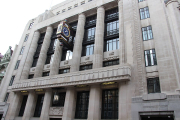
Disputes have arisen over trademark applications involving the name "Cambridge," leading to clashes between the city's renowned university and various companies seeking to register the
term. As the University of Cambridge aims to safeguard its intellectual property, tensions mount over the boundaries of its rights and the impact on local businesses daring to challenge the institution established for over 800 years.
One such case involves Tahl Holtzman's application to trademark his company, Cambridge NeuroTech, in 2017. Initially expecting a smooth process, Holtzman encountered opposition from the University of Cambridge on the final day before the objection window closed. The university's formal opposition left Holtzman bewildered, feeling as though the institution was claiming ownership over the term "Cambridge."
The university, while denying an assertion of ownership over Cambridge, holds trademarks for the term across various classes, covering a wide array of goods and services. Their argument rests on the notion of "acquired distinctiveness," enabling them to protect their brand from potential harm.
For companies like Cambridge NeuroTech, battling the university's opposition became financially and temporally burdensome. Holtzman highlights the inherent logic in naming his company based in Cambridge with a term like "neurotech," emphasizing the geographical relevance.
Similar struggles have been faced by other entities attempting to use "Cambridge" in their names or trademarks. Cambridge Clinical Laboratories, among others, encountered substantial legal fees in their trademark fight against the university's opposition.
Amid these clashes, Intellectual Property Office (IPO) hearings have ensued, where differing opinions emerged regarding the university's claims over the term "Cambridge." While some successful trademark registrations with "Cambridge" exist, hearings have critiqued the university's perceived overreach in claiming rights to the term across all fields of activity.
Barrister Beth Collett, specializing in intellectual property, acknowledges the university's entitlement to associate "Cambridge" with specific services beyond the city's name, citing the importance of demonstrating a distinctiveness for trademark registration.
In response, the University of Cambridge maintains its stance, citing public association and protection against confusion or misleading connections with its work. They stress a willingness to collaborate but assert a readiness to pursue legal action if their rights are infringed or if misrepresentation occurs.
The ongoing tensions underscore the intricate balance between protecting intellectual property and fostering innovation, particularly in a city steeped in history but also a hotbed of contemporary entrepreneurial endeavors. Photo by Cmglee, Wikimedia commons.









































